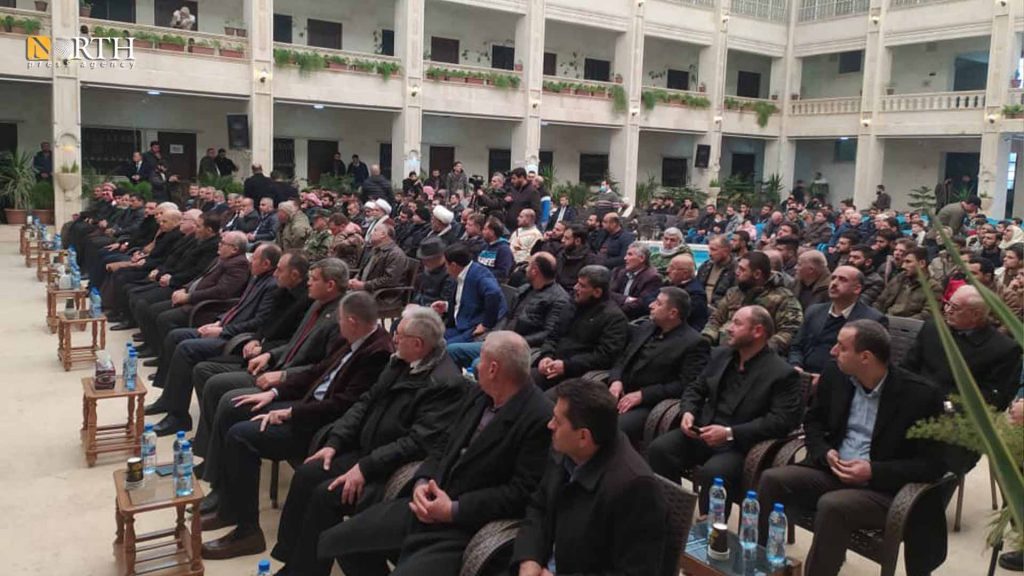
ALEPPO, Syria (North Press) – Iranian committees and associations commemorated in the city of Aleppo, north Syria, the second anniversary of the killing of former Iranian Quds Force commander Qasem Soleimani, while Syrians close to them believed there is no point in spending the money to achieve stronger influence.
On January 3, 2020, a US drone strike near Baghdad International Airport killed Qasem Soleimani and Abu Mahdi al-Mohandes, the deputy head of Iraq’s Hashd al-Shaabi militia (Popular Mobilization Forces/PMF) along with other escorts.

With the second anniversary of Soleimani’s killing, protests and condolences ceremonies were organized in Iran, Iraq, Lebanon and Syria.
In Mashhad al-Noqta in al-Zebdiyah neighborhood of Aleppo city, the memorial was held in the presence of government military and government officials, clerics, and members of Iran.
Soleimani had played a key role since the outbreak of protests in Syria in 2011, and was the mastermind behind the Iranian presence in Syria.
Opponent figures believe the goal of the Iranian intervention is to control the Syrian government’s decision, but Russia’s support for the Syrian government made it the controller of the main aspects of the regime’s policy in Syria.
Faced with this reality, Iran continues to maintain and strengthen lines of military, political, and cultural influence throughout the region by attracting young people into its factions, holding religious events, and establishing cultural associations loyal to it.
Political slogans
Badi’ Sheikh Hassan a pseudonym for a lawyer in Aleppo, said the goal of the events held by Iranian support and funding is clear, as Iran seeks to impose its culture and ideology.
“In terms of multiculturalism and acceptance of the other, there is no objection to the Iranian presence in a reasonable cultural and religious form,” he said.
Sheikh Hassan attended several cultural and religious activities held by Iran in the city, whether Mawlid (the Birth of prophet Muhammad), the memorial of the Isra and Mi’raj, the nights of Laylat al-Qadr and the Eid days.
But he believes that the political slogans raised in these events, such as “Death to America and the demise of Israel”, then excerpts from the life of Qasem Soleimani and others, “do not concern our people and do not enrich them”.
“What we need is a loaf of bread and oil to heat our children, and electricity to light the darkness of our homes, not enthusiastic words and sermons,” he further explained.
“Iran has not succeeded in penetrating the Aleppian society, despite all the momentum it has given to extending its influence. The population of all sects is interested in living and securing a decent life, and they do not care about anything else,” he added.
Non-Shiite communities
Jawad Hammoud, a retired teacher from the Shiite town of Zahraa in the northern countryside of Aleppo, believes that Tehran’s intensification of its religious presence is futile for its goal of the consolidation and dissemination of the ideology of Shiism with the Approach of Wilayat al-Faqih.
The idea of Imam Khomeini did not prevail among all Shiites, “How will Iran market it to non-Shiite communities,” Hammoud added.
Hammoud pointed out that every society has its own convictions, viewpoints, and needs.
Participants in religious festivals and events report that Iran spends large sums of money on it, as happened in the commemoration of Mawlid in the Adhamiya neighborhood, which cost 800 million Syrian pounds.
During their activities, these associations provide gifts and sums of money to attract religious and governmental figures and clan dignitaries.
Hussein al-Alam, a former member of the Iranian Misbah Association, believes that the Iranian-sponsored associations in Aleppo and its countryside achieve no goal other than creating a group of beneficiaries.
He told North Press that many clerics in Aleppo and its countryside, and even some officials, receive sums of money that are paid periodically in order to participate in every event held by Iran.
